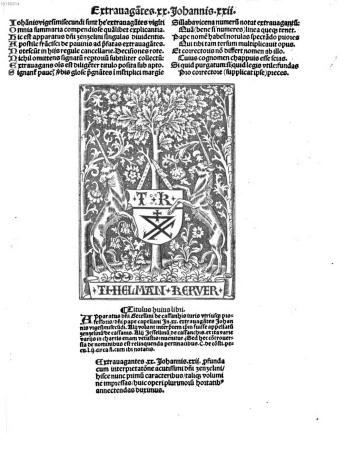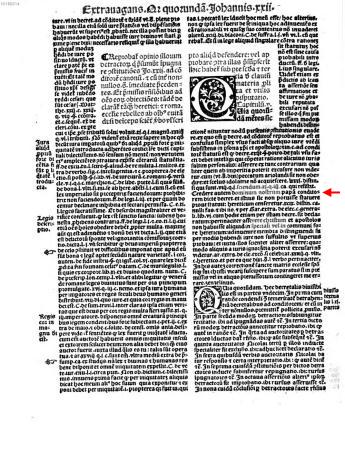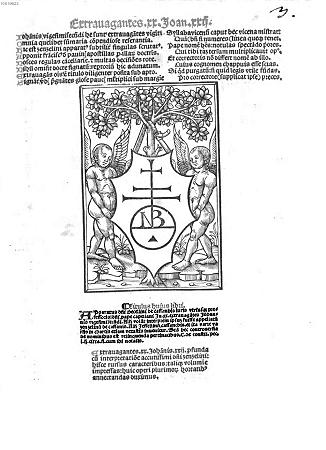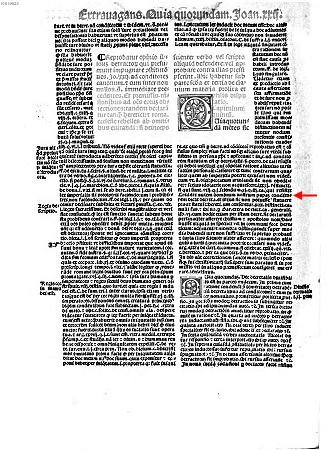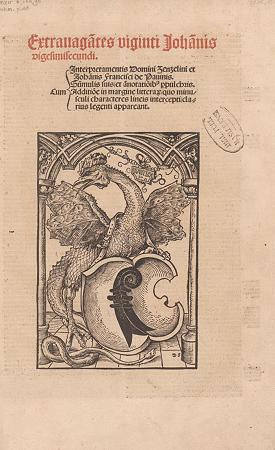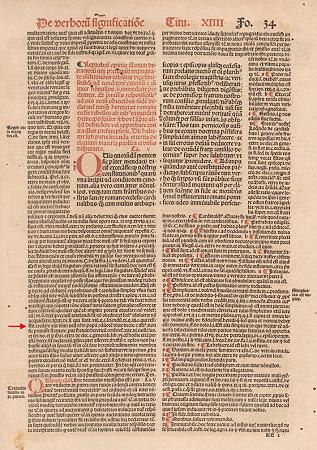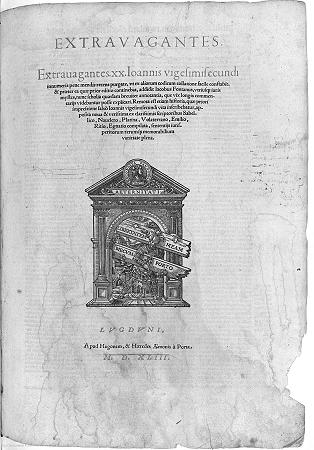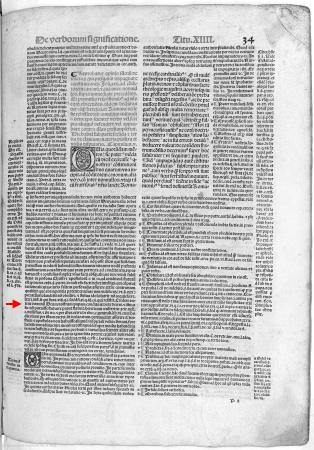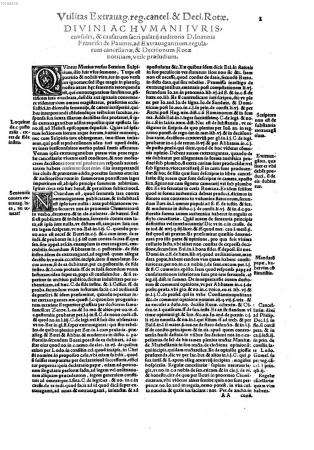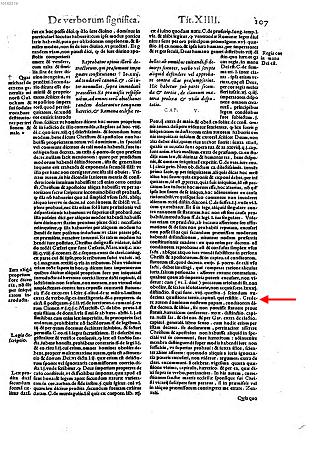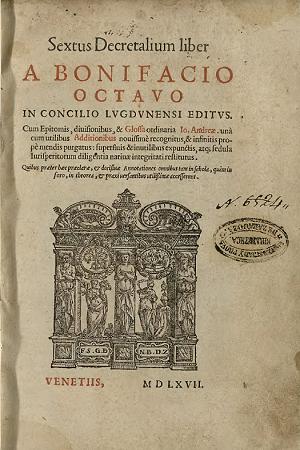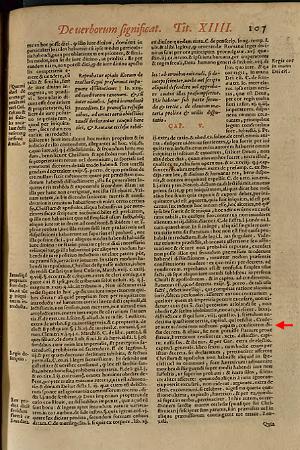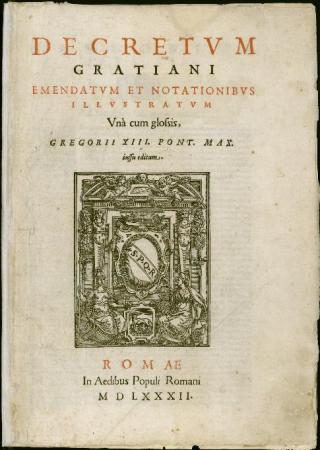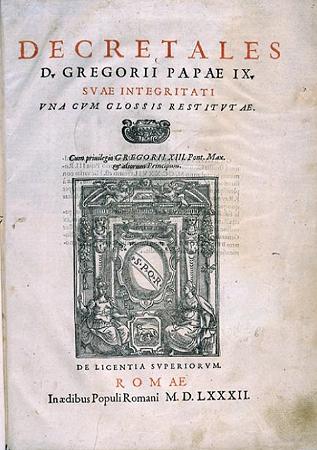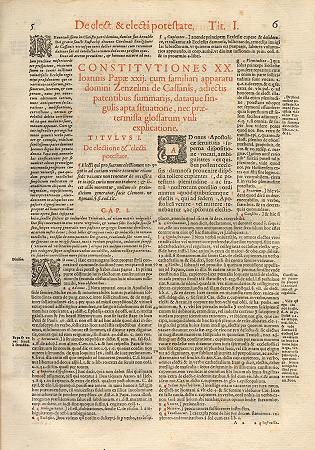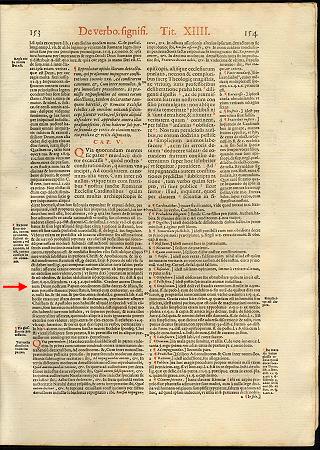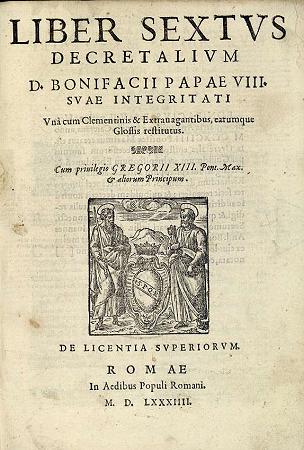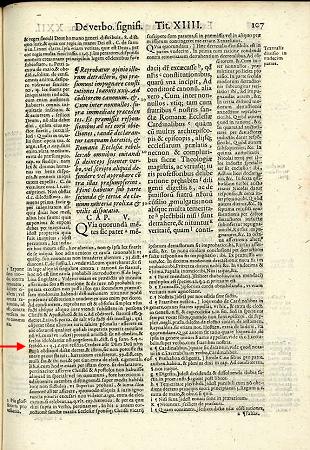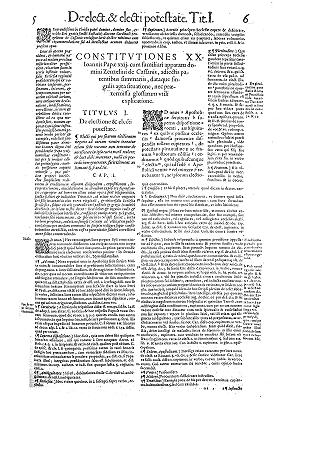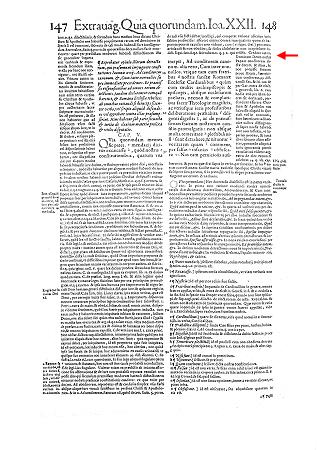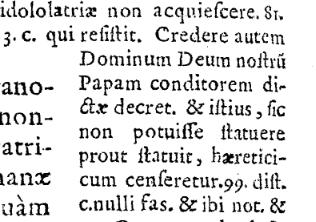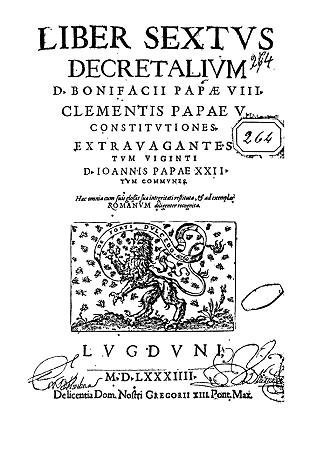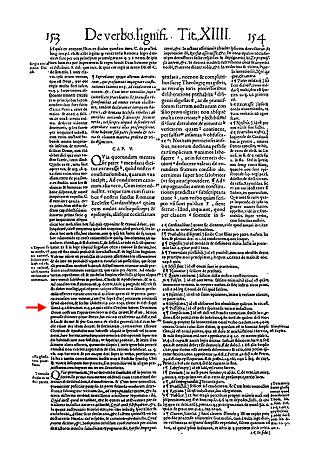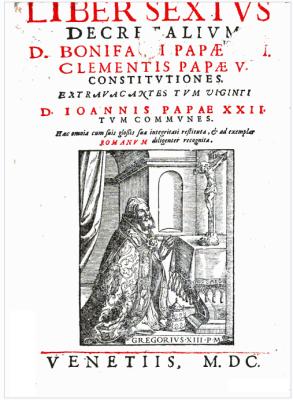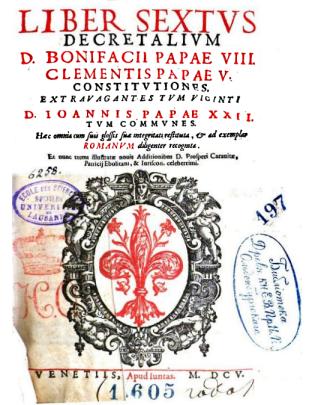Our Lord God the Pope in Latin is Dominum Deum
nostrum Papam.
It is abbreviated to Dnm Deu nrm
papa in the middle line, and
indicated by the red arrow.*
The text in which this occurs is called the gloss, and it is
the text on the margins, which in the above example, nearly fills the
page. The gloss is not the main text of the work, but rather a
commentary on the meaning, interpretation or significance of the main
text. It is essentially an opinion supplied by the canonist, someone
educated in canon
law, and as such the gloss does not necessarily carry with it the
authority of the main work. In this case the canonist was Zenzelinus
De Cassanis (died 1334). Here is a discussion of the context of the
issue from a Catholic viewpoint:
John XXII., in a decretal letter [the Bull "Cum
inter nonnullos", 12 November, 1323], condemned a doctrine which
exaggerated to the point of heresy the counsel of Evangelical
Poverty. This decretal is incorporated as Title xiv. into the Extravagantes
Joannis XXII., a collection of Papal Letters which finds place in
the Corpus Juris. The collection is authoritative, but, like
the rest of the Corpus Juris, it has bound up with it a valued
though unauthoritative commentary, or gloss. The glosses to the Corpus
Juris are from different canonists of repute, the gloss on the
portion with which we are concerned having for its author a certain
Zenzelinus. Zenzelinus, in the course of this comment on Title xiv.,
after discussing the Pope's meaning in the decretal, finishes by adding
that it would be heretical to deny the Pope's power to make such a
decree: ...
The rest can be read in Publications of the
Catholic Truth Society, Volume 29, 1896, Does the Pope Claim to be
God, by
Rev. Sydney F. Smith S. J., beginning
at the bottom of
page 14. Smith makes the case that this is nothing more than a
copiest error, and as he points out, the Vatican's edition does not
contain the word Deum. An enquiry made to
the Vatican Library in 2004 determined that the original 14th
century manuscripts in their possession read "dominum nostrum papam",
but that another edition from the end of the 16th century did read
"Dominum Deum nostrum Papam." Now, if you think this the obvious
explanation, I encourage you to read on. This issue has a fascinating
history behind it.
... "the commentators even gave the
pope the blasphemous appellation of Our Lord God The Pope." Two
hundred years ago this charge was brought against the commentators,
and two hundred years ago it was triumphantly refuted. You
probably have copied it, at first or second hand, from the Glossâ final. cap. cum inter Extra. Joan. xxii. Father
Eudaemon Joannes, in his Apology for Father Garnet, [Apologia
pro Henrico Garnetto, ad Actionem Cocqui] published
in 1610, informs us, that "in the passage in question, he found the
word Deum, (God), in some editions of the Gloss, and
omitted in others; that he therefore resolved to consult the Zenzelini
manuscript at the Vatican, which," he says, "might be seen every day;"
and that "he found that the real reading was, DOMINUM
NOSTRUM PAPAM," — OUR LORD THE POPE. After this explanation, you
will assuredly agree with me, that there is not greater reason to
charge the commentators on the Corpus Juris Canonici, with
giving to the pope the appellation of God, than to charge the church of
England with legalizing adultery, because, in some copies of
the English Bible, the word " not" is omitted in the commandment
against adultery. — The book of
the Roman-Catholic Church: By Charles Butler, Robert Southey,
Second Edition, 1825, pg. 130.
This blasphemous statement,
which has been the subject of controversy in your journal of late,
occurs in the gloss upon the Extravagant of John XXII., entitled "Cum
Inter. "... The "learned ecclesiastic," whose communication appears
in to-day's Post, suggests that it was a printer's blunder.
This is, however, simply impossible, as I can specify, if required, no
less than ten editions which contain it, and those printed at
different
places. Besides, it is well known that Pope Gregory XIII. appointed a
commission, in 1582, to prepare a new edition of the Canon Law. The
ecclesiastical commissioners were directed to "revise, correct, and
expurgate" not only the text, but the glosses. Yet the edition thus
prepared, and which is to the present day the standard edition, retained
the objectionable words, without the slightest intimation of anything
being wrong. Accordingly other editions published since that date, and
which are printed according to the Roman corrected copy, agree in
reading—"Our Lord God the Pope" I may name the following
instances: — That of Lyons, 1584: and those of Paris, 1585, 1601, and
1612. The "learned ecclesiastic" broaches an idea as to the expression
having sprung from the ancient practice of contracting words, but allow
me to remind him that the contractions to which he refers
had gone out of use very long before the date of the above Papal
revision. — The Bulwark, or
Reformation Journal, Vol. 10, Dec 1, 1860, pg.
164.
"... And lest some Eudemon should object to us that
the word 'God' ought to be regarded as
an error of the printer, we would have him know that the omission of
the word is rather to be esteemed so. For this is the state of the
case. Gregory the Thirteenth appointed certain cardinals and others to
revise and correct the Gloss of the Jus
Canonicum, wherever it was needed. While, then, many editions had the
word 'God,' and some had it not, the
new and corrected edition of the pontifical correctors of the press,
which came out under the sanction of Gregory the Thirteenth, restored
the word which had been omitted by the mistake of the
printers. . . . Nor is any change made in this point in the
censures of the Gloss of the Jus Canonicum edited by command of Pius
the Fifth*," p. 310. — The
Rainbow, A Magazine of Christian Literature, Oct 1, 1865, pg. 468-469.
*
F. Tommaso Manrique (Manrique, Tom´s), Censura
in glossas et additiones iuris canonici, omnibus exemplaribus
hactenus excusis, respondens. Librorum, titulorum
et capitulorum numerus omnibus paginarum vero Lugdun. et Venet.
Codicibus post annum 1553 impressis, respondet. Romae, Apud Haeredes
Julii Accolti, M. D. LXXII. (1572), Die 22. Augusti.
In
1578, Pope Gregory XIII formally appointed a small commission of
learned cardinals and other clerics, generally referred to as the Correctores
Romani, to set about the task of editing the Decretum. From
the early 1570s at least, scholars working under papal auspices had
been preparing the way. They had gone through the Vatican's
manuscripts, then sent letters out across Catholic Europe, asking for
the loan of, or copies of, manuscripts of Gratian and earlier canonical
collections, seeking to collect the best examples local churches could
provide. Responses came from curia cardinals, from remote Spanish
monasteries, from beleaguered prelates in the Low Countries. The Correctores
worked their way though the texts of the Decretum, collating
the manuscripts, comparing and discussing variant readings they
encountered, and keeping copious notes as they chose the readings they
thought most accurate for the new edition. That Roman edition,
published in 1582 with Gregory XIII's letter of authorization as its
preface, became the standard text within the Catholic world. — The Treatise on Laws
(Decretum Dd. 1-20) With the Ordinary Gloss, copyright 1993, The
Catholic University of America, pg.
xix.
It is quite as certain that the Popes have never
reproved or
rejected this title, for the
passage in the gloss referred to, appears in the edition of the Canon Law,
published at Rome in 1580, by Gregory XIII., and the "Index Expurgatorius"
of Pius V., which orders the erasure of other passages, yet leaves this
one. — Tentativa theologica: Episcopal rights and
ultramontane usurpations by Fr. António Pereira de
Figueiredo, Priest and Doctor of Lisbon, translated from the
original Portuguese, with notes, and some additional matter by the Rev.
Edward H. Landon, M.A. ... London, 1847,
pg. 180.
Here is the book in Portuguese.
The above wording, though, comes from the appendix Pereira published later, Appendix, E Illustracaō
Da Tentativa Theologica, Sobre O Poder Dos Bispos em tempo de Rotura,
seu autor Antonio Pereira ... Lisboa, 1768,
pgs. 123-124. Also at
Bavarian State Library.
In the tables, editions confirmed to use "Deum" are
in red.
Editions that are claimed to use "Deum", but are unconfirmed, are black.
Below is a second 1584 edition, with a different typeset.
UNAM SANCTAM
In the next section of the official 1582 edition
of Catholic Canon Law, we find the text of a papal bull that is the
subject of much controversy, even among Catholics themselves, as many
consider it to be an infallible magisterial pronouncement:
Igitur ecclesiae unius et unicae unum corpus,
unum caput, non duo capita, quasi monstrum, Christus videlicet et
Christi vicarius, Petrus, Petrique successor, dicente Domino ipsi
Petro: ... Quicunque igitur huic potestati a Deo sic ordinatae
resistit, Dei ordinationi resistit, nisi duo, sicut Manichaeus, fingat
esse principia, quod falsum et haereticum judicamus, quia, testante
Moyse, non in principiis, sed in principio coelum Deus creavit et
terram. Porro subesse Romano Pontifici omni humanae creaturae
declaramus dicimus, definimus et pronunciamus omnino esse de
necessitate salutis.
Therefore, of the one and only Church there is
one body and one head, not two heads like a monster; that is, Christ
and the Vicar of Christ, Peter and the successor of Peter, ...
Therefore whoever resists this power thus ordained by God, resists the
ordinance of God [Rom 13:2], unless he invent like Manicheus two
beginnings, which is false and judged by us heretical, since according
to the testimony of Moses, it is not in the beginnings but in the
beginning that God created heaven and earth [Gen 1:1]. Furthermore, we
declare, we proclaim, we define that it is absolutely necessary for
salvation that every human creature be subject to the Roman Pontiff.
Corpus Juris Canonici, Extravagantes Communes,
book I, title 8, chapter I.
De majoritate et obedientia, col. 202, Unam Sanctam, Bull of Pope
Boniface VIII promulgated November 18, 1302,
(Unam Sanctam in English and Latin). In the gloss by French canonist Petrus
Bertrandus (Peter
Bertrand 1280-1349) for the last
sentence of Unam Sanctam, we find this:
Christus commissit summo Pontifici vices suas,
(ut habetur Matth. 16. cap. et 24. q I. quodcumque.) Sed Christo data
erat omnis potestas in caelo et in terra (Matth. 28.) ergo summus
Pontifex qui est ejus vicarius habebit hanc potestatem. (Liber Extra,
de transla episc. ca. Quanto personam.) — Corpus
Juris Canonici, 1582 edition, Vol. III, Extravagantes Communes,
lib. 1. De majoritate et obed. (On Authority and Obedience), title 8,
c. 1., gloss on Unam Sanctam, verb. Porro subesse Romano
Pontifici, col.
212.
Christ entrusted his office to the chief
Pontiff; (Mat 16:18, Mat 24:45) but all power in heaven and in earth
had been given to Christ; (Mat. 28:18) therefore the chief Pontiff, who
is his vicar, will have this power. (Translation
source) See also Mysterious Quote Regarding Pope
Found!
So, Christ and the Pope are a single head.
This sentiment is the same as that expressed in Our Lord God the Pope.
(This hyperbole, as some would deem it, that easily crosses the line to
blasphemy, is not uncommon among some Catholics. See Sweet Christ on
Earth.)
Jan Hus, burned at the stake in 1415 for heresy,
wrote:
Eph. 1:20 [-23]: “Which God wrought in Christ
when he raised him from the dead and made him to sit at his right hand
in the heavenly places, far above all rule and authority, power and
dominion, and every name which is named not only in this world but also
in the world which is to come, and has put all things under his feet
and gave him to be head over all things to the church, which is his
body.”
From this it is clear that, if any Christian
were to be the head of the universal church with Christ (for the church
cannot be a monster having two, as is set forth in Boniface VIII’s
bull, beginning Unam sanctam, therefore, the bull says, “the
church is one body and has one head, not two heads, like a monster”),
it would be necessary to concede that the Christian who was the head of
that church was Christ himself, or otherwise it would be necessary to
concede that Christ is inferior to that Christian and a lowly member of
him. The conclusion shows that the thing is impossible. Hence, the holy
apostles agreed in confessing that they were servants of that one Head
and humble ministers of the church, his bride. No one of the apostles
ever presumed to claim that he was the head or the bridegroom of the
church, ... — The Church by
John Huss (1411). Translated, with Notes and Introduction by
David S. Schaff, D.D. (New York: Charles Scribner’s Sons, 1915), Chapter
4, Christ The Only Head Of The Church.
Satis evidenter & Donation
of Constantine
In Volume 1 of the same 1582 corrected and
approved "In Aedibus Populi
Romani" edition of Decretum Gratiani, Pope Nicholas I, in a letter to
Emperor Michael, says:
Satis evidenter ostenditur, a saeculari
potestate nec ligari prorsus nec solvi posse Pontificem; quem constat a
pio principe Constantino (quod longe superius memoravimus) Deum
appellatum: nec posse Deum ab hominibus judicari manifestum est.
It is evidently enough shown that the Pontiff,
whom it is clear was
called God by the pious Prince Constantine (which we have related
above), cannot be bound nor loosed by the secular power: and it is
manifest that God cannot be judged by men.
See
Decretum Gratiani, Decreti Prima Pars, Distinctio
96, C. vii — Cols. 619-620, pg. 378.
Just 2 pages more, in the same volume, we find the
Donation of
Constantine, and the title vicarius filii dei:
See
Decretum Gratiani, Decreti Prima Pars, Distinctio
96, C. xiiii — Cols. 623-624, pg. 380.
The Pope and the Council
... a saying ascribed to
Constantine, at the Council of Nice, in a legend recorded by
Rufinus, was amplified till it was fashioned into a perfect mine of
high-flying pretensions. Constantine, according to this fable, when the
written accusations of the bishops against each other were laid before
him, burned them, saying, in allusion to a verse of the Psalter, that
the bishops were gods, and no man could dare to judge them. Nicolas I.
quoted this to the Emperor Michael.2
Anselm adopted the story into his collection, Gratian followed, and
Gregory himself found in it clear evidence that he, the Pope, the
bishop of bishops, stood in unapproachable majesty over all monarchs of
the earth. For, as the passage stood in Anselm and Gratian, it was the
Pope whom Constantine called a god, and so it has been understood and
explained ever since. 3
2
Mansi, xv. 215.
3Dist. 96, c. 7. "Satis
evidenter ostenditur a saeculari potestate nec ligari prorsus nec solvi
posse Pontificem, quern constat a pio Principe Constantino Deum
appellatum, nec posse Deum ab hominibus judicari manifestum est."
—The Pope
and the Council by Johann Joseph Ignaz von Döllinger,
pg. 89.
Psa 82:1 A Psalm of Asaph. God standeth in the
congregation of the mighty; he judgeth among the gods.
...
Psa 82:6 I have said, Ye are gods; and all of you are children of the
most High.
See also The British quarterly review,
Volume LXI (61), April, 1875, Art. VI.— Ultramontanism
and Civil Allegiance, pgs.
457-459, for more on the inflation of Constantine's remarks at the
council of Nicea.
The
Acts and Monuments of John Foxe
All the earth is my diocese;
and I the ordinary of all men, having the authority of the King of all
kings upon subjects. I am all in all, and above all, so that God
himself, and I the vicar of God, have both one consistory,190
and I am able to do almost all that God can do, 'clave non errante!'191
Item, It is said of me that I have a heavenly arbitrement,192
and therefore am able to change the nature of things, 'substantialia
unius applicando alteri,' and of nothing to make things to be; and of a
sentence that is nothing, to make it stand in effect; in all things
that I list, my will to stand for reason: for I am able by the law to
dispense above the law, and of wrong to make justice, in correcting
laws and changing them.
You have heard hitherto sufficiently out of my
doctors. Now you shall hear greater things out of mine own decrees.
Read there dist. 96. cap.7. 'Satis.' 193 Also
Caus. 11. q. 1. cap. 41. 'Sacerdotibus. 194 Also
Caus. 12. q. 1. cap. 15. 'Futuram.' 195 Do not you
find there expressed, how Constantine the emperor, sitting in the
general council at Nice, called us prelates of the church all
'gods'? Again, read my canon decretal, De transl. episc. cap.
'Quanto.' 196 Do you not see there manifestly
expressed, how not man, but God alone separateth that which the bishop
of Rome doth dissolve and separate? Wherefore, if those things that I
do, be said to be done not of man, but of God ; what can you make me
but God? aa Again, if prelates of the church be called and
counted of Constantine for gods, I then, being above all prelates, seem
by this reason to be above all gods. Wherefore no marvel, if it be in
my power to change time and times, to alter and abrogate laws, to
dispense with all things, yea with the precepts of Christ:±
for, where Christ biddeth Peter
put up his sword, and admonished his disciples not to use any outward
force in revenging themselves, do not I, Pope Nicholas, writing to the
bishops of France, exhort them to draw out their material swords in
pursuing their enemies, and recovering their possessions; setting
against the precept of Christ, the prophet saying, "Dissolve
colligationes impietatis!" &c.197[Isa 58:6 ... to loose
the bands of wickedness ...]
(188)
Gloss, in caus. 11. q. 3. c. 14. 'Absit.'
(189) Gloss, in caus. 11. q. 3. 'Si
inimicus.'
(190) Hostiensis
[Henricus de Segusia] in c. 'Quanto de transl. praeb.' [Lectura
ad Decretales, I. vii. 3: "Consistorium Dei et papae unum et idem
est censendum."] See below also.
(191) Ex summa
casuum fratris Baptista.
(192) Ex Citatione Henr. Bulling, de
fine Seculi. orat. prima. [1st sermon pgs.
55-56]+
Item, ex Citatione
Jacobi Andreas, adversus Hossum, lib. v.
Item, ex Citatione
Hier. Marii in actis [secundi Diei, p. 180: Causa xvii. q. 4. c. 30.]
(193) Pope Nicolaus, Dist. 96. c. 7 'Satis.'
(194) [Causa] 11. q. 41. 'Sacerdotibus.'
(195) [Causa] 12. q. 1. '
Futurum.'
(196) Decretal. [Greg. IX.] de Transl. [lib. i. tit. 7.] c. 3. 'Quanto.'
(aa) Thus you may see it verified, that St. Paul prophesieth, of the
adversary sitting in the temple as God and boasting himself above all
that is named God, &c. 2 Thess. 11.
(197) Pope Nicolaus, Causa 15, q. 6. c. 'Autoritatem.'
— The Acts and
Monuments of John Foxe, Volume 4, Part 1, 1856, by John Foxe
(1516-1587), pgs. 159-160.
+ De fine saeculi et
judicio venturo Domini nostri Jesu Christi, deque periculis nostri
hujus seculi corruptissimi gravissimis, et qua ratione fiant innoxia
piis; orationes duae, habitre in coetu cleri per Heinrychum
Bullingerum.
Basil. 1557. [These sermons on Matt. xxiv., Dan. vii., and 2 Tim.
iii., were preached, the former 12 Sept. 1555, and the latter 28
January, 1557. They were "englished by Thomas Potter;" and "imprinted
at London, at the long shop in the Pultrie, by John Allde."
Bullinger, Heinrich, & Potter, Thomas, Of
the end of the world and iudgement of our Lord Iesus Christe to come,
and of the moste perillous dangers of this our moste corrupt age, and
by what meanes the godly may auoid the harmes thereof, sermons
preached in latin in the assembly of the clergie by Henry Bullinger,
and now lately englished by Thomas Potter. by John Allde, Imprinted at London.
1580.
± Note
carefully that this is John Foxe expressing in his words
the likely thoughts of the pope out loud. It is not a direct
papal quote, but a synthesis of the extrapolated meaning of the
referenced documents found in canon law as listed. Essentially
the same information and similar wording is found in Illustrations
of Popery: The "Mystery of Iniquity" Unveiled: J. P. Callendar,
1838,
pgs. 209-210. This is frequently misquoted and attributed to "Decretal.
de Tranlatic Episcop Cap". In
Quanto personam, Pope Innocent III actually asserts that only the
Roman Pontiff has the power to transfer and separate bishops. It was a
letter addressed to five bishops in Germany regarding Conrad of
Querfurt, a bishop who had transferred himself, without papal
permission, from Hildesheim (Hildesemensis) to Würzburg
(Herbipolensis). The key sentence, in which divine authority to govern
the church in such matters is claimed solely for the Bishop of Rome,
reads:
Non enim homo, sed
Deus separat, quos Romanus Pontifex (qui non puri hominis, sed veri Dei
vicem gerit in terris) ecclesiarum necessitate vel utilitate
pensata,
non humana, sed divina potius auctoritate dissolvit.
God, not man,
separates
[a bishop from his Church] because the Roman Pontiff does not exercise the
office of a man, but of the true God on earth, carefully considering the
need and usefulness of each translation, he dissolves the bond by divine rather than by
human authority.
See 196 above.
Also, the placement of footnotes above has been changed from the
original, from leading to trailing, for clarity.
The adjacent gloss
in column 217 for "veri Dei vicem" in
Decretal. [Greg. IX.] de
Transl. [lib. i. tit. 7.] c. 3. 'Quanto', adds the following regarding the
scope of the
Pope's authority as God's true vice governor:
veri Dei vicem
(gerit).]
Unde dicitur
habere caeleste arbitrium ( [Justinian
Code] Cod. de sum. tri. 1. I. in fi.),
Whence he is said to possess a divine judgment,
et ideo etiam
naturam rerum immutat, substantialia unius rei applicando alii (arg. C.
communia de leg. l. 2),
and therefore he altereth the very nature of things, by applying the
things that are of the substance of one thing unto another,
et de nullo potest
aliquid facere
(C. rei uxor. act. l. unica in prin. et De Consecr. Dist.
2. c. 69, Cols. 2549-2550),
and of nothing he can make something; [to make something out of nothing
is to construct new laws];
et sententiam, quae
nulla est, facit aliquam
(Caus. III. Qu. 6. c. 10); Haec
quippe, Cols. 979-980.
and that sentence which is of no force he can make to be of
force;
quia in his, quae
vult, ei est pro ratione voluntas
(Instit. de jure natu. § sed quod principi. Haec
quippe.)
and he can do these things, because his will stands for reason.
Nec est, qui ei
dicat, cur ita facis?
(De Poen. Dist. 3. c. 22. ex psona. alias est in c.
Quamuis, Cols. 2309-2310)
Neither is there any may say unto him, Why dost thou so?
Ipse enim potest
supra jus dispensare
(infra, Lib. III. Tit. 8. c. 4, j. de conces. prae. c. Proposuit.
Cols. 1069-1070)
for he can dispense above the law,
idem de injustitia
potest facere justitiam corrigendo jura et mutando
(Lib. II. Tit. 28. c. 59., j. de appella c.
Vt debitus., Cols. 959-960,
Lib. IV. Tit. 14. c. 8, et j. de cosang. et affinit. cap.
Non debet., Cols. 1513-1514)
and of unrighteousness make righteousness, correcting and changing laws,
et plenitudinem
obtinet potestatis
(Caus. II. Qu. 6. c. 11) Decreto, Cols.
869-870:
for he hath the fullness of power.
The references in the
gloss are supplied in:
A Compendium of
Ecclesiastical History, by Dr. John C. L. Gieseler, Fourth Edition
Revised And Amended, Volume III, 1853, translated from the German by
the Rev. John Winstanley Hull, M.A.
pg. 161.
The English
translation of the gloss is primarily from:
The Decades of
Henry Bullinger, The Fifth Decade, By Heinrich Bullinger,
Translated By H. I., 1852,
pg. 121.
See also:
Liber Sextus, Book 1,
Titulus 6: De electione et electi potestate, c. xvii:
Fundamenta, col. 129. (col. 132, Romani Pontificis
vicarii Dei, & footnotes z & t)
A Sketch Of The
Romish Controversy By G. Finch, London, 1831,
pg. 318. This book incorrectly reads "Ipse enim potest s. jus
dispensare" in the gloss as "Ipse enim potest sanctum jus
dispensare" (for he can dispense with holy laws,). The
referenced section in the gloss to Lib. III shows that "supra" (for he
can dispense above the law,) is correct.
Agostino Trionfo of Ancona (Augustinus Triumphus)
1243-1328 A.D.
Summa de potestate ecclesiastica (Summary On The Power Of The
Church)
Question 6 Ad 1:
Secunda ratio accipitur ex parte Papae. solus Papa dicitur esse
Vicarius Dei: quia solum quod ligatur vel solvitur per eum, habetur
solutum et ligatum per ipsum Deum. Sententia igitur Papae et sententia
Dei vna sententia est: sicut una sententia est Papae, et auditoris
eius. Cum igitur appellatio semper fiat a minori iudice ad superiorem,
sicut nullus est major seipso: ita nulla appellatio tenet, facta a Papa
ad Deum: quia unum consistorium est ipsius Papae et ipsius Dei: cuius
consistorij clauiger et ostiarius est ipse Papa. Nullus ergo potest
appellare a Papa ad Deum. Nullus ergo potest appellare a Papa ad Deum,
sicut nulla potest intrare ad consistorium Dei, nisi mediante Papa, qui
est aeternae vitae cónsistorij clauiger, et ostiarius et sicut nullus
pot appellare ad se ipsum: ita nullas pót appellare à Papa ad Deu. quia
vna sententia est, et vna curia Dei, et Pape.
Second reason considering the role of the Pope. Only the Pope is said
to be the Vicar of God: because he alone is able to bind and loose,
possessing alone loosing and binding given to him by God. The decision
of the Pope and the decision of God constitute one decision, just as
the decision of the Pope and his disciple are the same. Since,
therefore, an appeal is always taken from an inferior judge to a
superior, as no one is greater than himself, so no appeal holds when
made from the Pope to God, because there is one consistory of the Pope
himself and of God Himself, of which consistory the Pope himself is the
key-bearer and the doorkeeper. Therefore no one can appeal from the
Pope to God, as no one can enter into the consistory of God without the
mediation of the Pope, who is the key-bearer and the doorkeeper of the
consistory of eternal life; and as no one can appeal to himself, so no
one can appeal from the Pope to God, because there is one decision and
one court of God, and the Pope. (Translation
source)
Question 9: De
Exhibitione Honoris Papae. (pg. 71, 1582 edition.)
Displaying honor to the Pope.
Articulus 1:
Utrum honor, qui debetur Christo secundum quod Deus, debeatur Papae.
Whether the honor due Christ as God is due the Pope.
Ad Primum sic
proceditur. Videtur enim, quod honor, qui debetur Christo secundum,
quod Deus debeatur Papae. Quia honor debetur potestati: sed una est
potestas Christi secundum quod Deus, et Papae. quod probatur.
So proceeding on
the first point. It is to be seen as fact that the honor that is due
Christ as God is due also to the Pope: because the honor is due the
power, and the power of Christ as God and the [power of the] Pope are
one, which is shown to be true.
ALL OF CHRIST'S SCRIPTURAL NAMES ARE ALSO
APPLIED TO THE POPE
Cardinal
Robert Bellarmine (1542-1621), a Doctor of the Church, in his
Disputationes de controversiis christianae fidei, Adversus hujus
temporis Haereticos (Debates on the Christian Controversies of Faith
Against Contemporary Heresy), claimed that all the names that
Scripture applies to Christ are also to be applied to the Pope. In
Volume 2, LIBER SECVUNDUS, De Conciliorum auctoritate (Book 2, The
Authority of Councils) we find the following:
CAPVT XVII
Summam Pontificem absolute esse supra Concilium.
TERTIA
propositio. ...
SECUNDO probatur ratione, in scripturis fundata: nam
omnia nomina, quae in scripturis tribuuntur Christo, unde constat eum
esse supra Ecclesiam, eadem omnia tribuuntur Pontifici: ac primum,
Christus est paterfamilias in domo sua, quae est Ecclesia, Pontifex in
eadem, est summus oeconomus, id est, paterfamilias loco Christi, Lucae
12. —
Bellarmini,
Disputationes, Tom. II, Lib. II, De Conciliorum auctoritate, Cap. XVII, col. 95, 1608, Paris.
A 1613 printing.
CHAPTER 17
The Supreme Pontiff is absolutely above a Council.
THIRD
proposition: ...
SECOND it is proved by an argument, founded in the
scriptures: for all the names, which in the scriptures are applied to
Christ, proving him to be above the Church, are in like manner applied
to the Pontiff: as first, Christ is head of the family in his own
house, which is the Church. The Pontiff is high steward in the same,
that is, he is head of the family in the place of Christ, Luke 12:42. (Translation
source) (See this Vatican portrait of Benedict XVI titled "The
Truth, The Way and The Life".)
John 14:6 Jesus saith unto him, I am the way, the truth, and the life: no man cometh
unto the Father, but by me.
Luke
12:42 And the Lord said, Who then is that
faithful and wise steward, whom his lord shall make ruler over his
household, to give them their portion of meat in due season?
As the translator alludes to, all
attempts to apply Luke 12:42 (and Matt. 24:45) to the papacy are easily
"exploded", when the long history of persecution by the Roman Catholic
Church is considered:
Luke 12:45 But
and if that servant say in his heart, My lord delayeth his coming; and
shall begin to beat the menservants and maidens, and to eat and drink,
and to be drunken;
Luke 12:46 The lord of that servant will come in
a day when he looketh not for him, and at an hour when he is not aware,
and will cut him in sunder, and will appoint him his portion with the
unbelievers.
Mat 24:48 But
and if that evil servant shall say in his heart, My lord delayeth his
coming;
Mat 24:49 And shall begin to smite
his fellowservants, and to eat and drink with the drunken;
Mat 24:50 The lord of that servant
shall come in a day when he looketh not for him, and in an hour that he
is not aware of,
Mat 24:51 And shall cut him asunder,
and appoint him his portion with the hypocrites: there shall be weeping
and gnashing of teeth.
Dan 7:25 And he shall speak great
words against the most High, and shall wear out the saints of the most
High, and think to change times and laws: and they shall be given into
his hand until a time and times and the dividing of time.
Rev 13:4 And they worshipped the
dragon which gave power unto the beast: and they worshipped the beast,
saying, Who is like unto the beast? who is able to make war with him?
Rev 13:5 And there was given unto him a mouth speaking great things and
blasphemies; and power was given unto him to continue forty and two
months.
Rev 13:6 And he opened his mouth in blasphemy against God, to blaspheme
his name, and his tabernacle, and them that dwell in heaven.
Rev 13:7 And it was given unto him to make war with the saints, and to
overcome them: and power was given him over all kindreds, and tongues,
and nations.
Rev 13:8 And all that dwell upon the earth shall worship him, whose
names are not written in the book of life of the Lamb slain from the
foundation of the world.
Rev 17:6 And I saw the woman
drunken with the blood of the saints, and with the blood of the martyrs
of Jesus: and when I saw her, I wondered with great admiration.
In the papal bull Unam Sanctam, in
which Pope Boniface VIII claimed Christ and the Pope are a single
head, he also claimed control over both the temporal civil sword, and
the spiritual sword:
We are informed by the texts of the
gospels that in this Church and in its power are two swords; namely,
the spiritual and the temporal. For when the Apostles say: 'Behold,
here are two swords' [Lk 22:38] that is to say, in the Church,
since the Apostles were speaking, the Lord did not reply that there
were too many, but sufficient. Certainly the one who denies that the
temporal sword is in the power of Peter has not listened well to the
word of the Lord commanding: 'Put up thy sword into thy scabbard'
[Mt 26:52]. Both, therefore, are in the power of the Church, that is to
say, the spiritual and the material sword, but the former is to be
administered for the Church but the latter by the Church; the former in
the hands of the priest; the latter by the hands of kings and soldiers,
but at the will and sufferance of the priest.
However, one sword ought to be
subordinated to the other and temporal authority, subjected to
spiritual power. For since the Apostle said: 'There is no power
except from God and the things that are, are ordained of God' [Rom
13:1-2], but they would not be ordained if one sword were not
subordinated to the other and if the inferior one, as it were, were not
led upwards by the other.
(Unam Sanctam in English and Latin).
Scripture prophesied that this
blasphemous persecuting power would be killed by the very sword it
wielded against the saints:
Rev 13:10 He that leadeth into
captivity shall go into captivity: he that killeth with the sword must
be killed with the sword. Here is the patience and the faith of the
saints.
See also
Pope Enthroned Between
Cherubim, Showing himself that he is God.
and Time,
Times, and Half a Time
